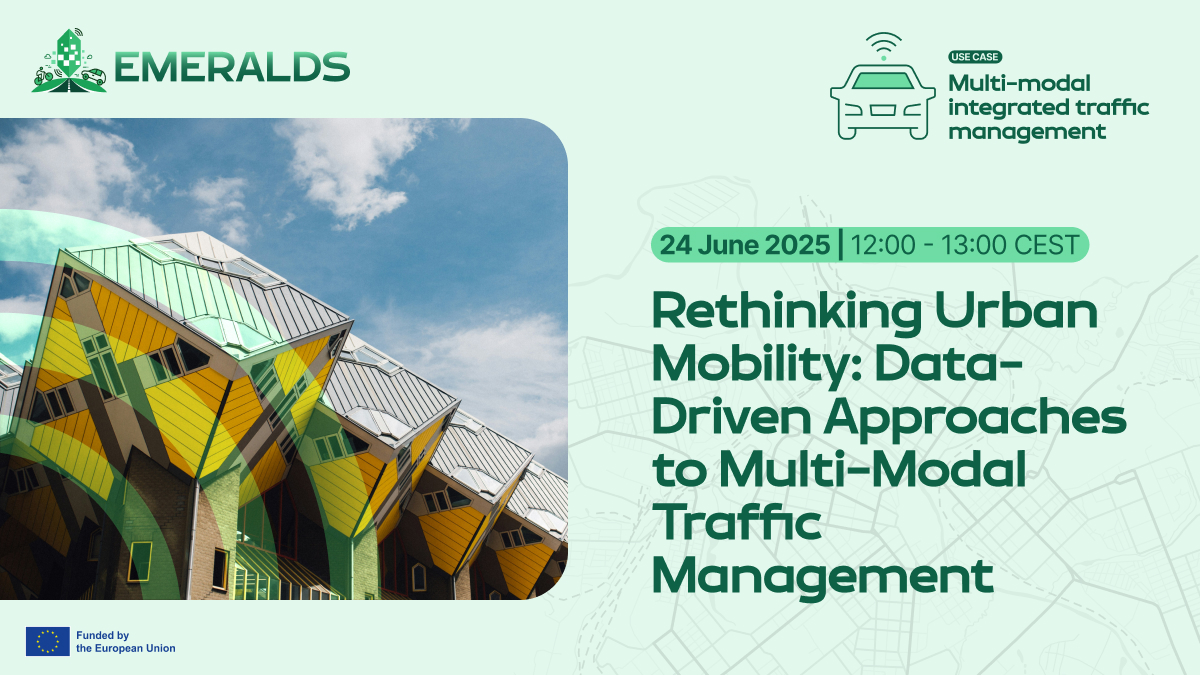
Challenge: Traffic congestion and growing demand for sustainable mobility solutions
Traffic congestion remains one of the most visible and persistent challenges for modern cities. As urban populations grow and mobility demands increase, local authorities face growing pressure to manage traffic flow, reduce emissions, and promote sustainable transport options. This EMERALDS webinar focuses on work being carried out in the Rotterdam metropolitan area, where ARANE is exploring how to improve multi-modal traffic management through advanced data-driven methods.
Smart strategy: from reactive to predictive
The session will highlight how EMERALDS is helping shift the focus from reactive to predictive strategies by making better use of existing, heterogeneous data sources—including vehicle, public transport, bicycle, weather, and emissions data. These insights feed into more effective multi-modal traffic forecasts, designed to support anticipatory and decentralised decision-making.
By analysing interdependent traffic networks across active, public, and private modes, the Rotterdam pilot investigates methods to estimate and predict multi-modal operations, detect bottlenecks, and reduce reliance on costly, dedicated data collection efforts. The approach also explores the use of explainable AI in real-time contexts to improve transparency and trust in traffic control systems.
The webinar invites a conversation on how cities can adapt to complex traffic dynamics by applying scalable, integrated solutions, making better use of what they already know.
Speakers
- Konstantinos Dafloukas - Inlecom Innovation - Project Coordinator
- Sascha Hoogendoorn-Lanser - TU Delft - UC WP Leader
- Erik-Sander Smits - Arane - UC Leader
- Marialetizia Mari - Trust-IT - Moderator
Agenda
| Timing | Speaker(s) | Topics and Discussion | |
|---|---|---|---|
Welcome & EMERALDS Project Introduction |
|||
| 12:00 - 12:10 |
Konstantinos Dafloukas |
EMERALDS leading the advancement of urban mobility solutions
|
|
Session: Multi-Modal Traffic Management & overall WP Overview |
|||
| 12:10 - 12:25 | Sascha Hoogendoorn-Lanser |
Reactive to Predictive approach
|
|
Session: Rotterdam Use Case Deep Dive & Implementation Insights |
|||
| 12:25 - 12:55 | Erik-Sander Smits |
The Rotterdam metropolitan area as a pilot for advanced mobility models
|
|
Session: Q&A Session |
|||
| 12:55 - 13:00 | All the Panellists | Interactive discussion with participants on implementation challenges and solutions. | |
Audience
- Urban Planning & Transportation Professionals
- Traffic management specialists and transportation planners
- Smart city coordinators and urban mobility managers
- Municipal transport authorities and local government officials
- Public transport operators and mobility service providers
- Technical & Research Community
- Data scientists and AI researchers working in urban mobility
- Transportation engineers and traffic modelling specialists
- Academic researchers in smart cities and sustainable transport
- Technology vendors developing traffic management solutions
- Policy & Decision Makers
- City mayors, councillors, and urban policymakers
- Regional transportation authorities and metropolitan planning organisations
- Sustainability officers and environmental policy professionals
- EU project managers and funding body representatives
- Industry Stakeholders
- Mobility-as-a-Service (MaaS) providers
- Automotive industry professionals working on connected vehicles
- Urban tech startups and innovation consultants
- Infrastructure and technology solution providers
- Knowledge Networks
- European research networks and innovation clusters
- Smart city communities and professional associations
- Transportation and logistics industry associations
- Urban resilience and climate adaptation practitioners
Ideal additional & potential Audience
- Cities facing similar multi-modal traffic challenges as Rotterdam
- Organisations implementing or considering predictive traffic management systems
- Professionals interested in explainable AI applications in urban contexts
- Stakeholders working on data integration for smart city initiatives